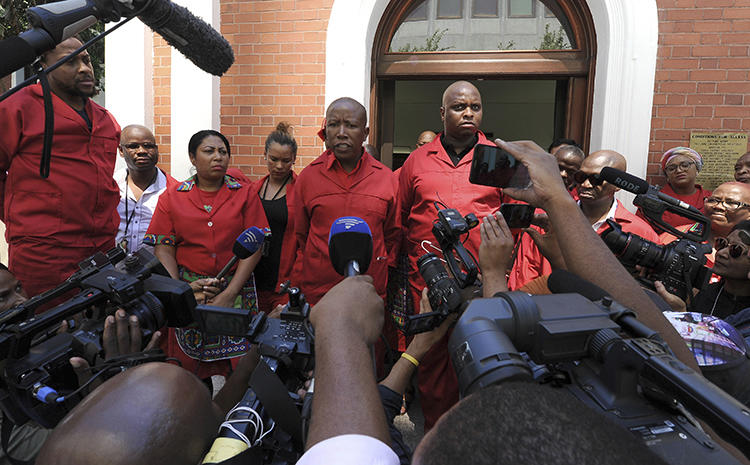Washington, D.C., March 8, 2019–The Committee to Protect Journalists today expressed grave concern about threats and harassment against veteran South African journalist Karima Brown–allegedly by supporters of the Economic Freedom Fighters (EFF)–after her phone number was published on Twitter by EFF leader Julius Malema. CPJ also called for the Electoral Commission of South Africa to determine whether Malema contravened the electoral code of conduct by doxxing Brown.
South Africa is due to hold parliamentary elections May 8.
In a tweet late March 5 to his 2.3 million followers, Malema posted Brown’s phone number in a screen grab of a message she mistakenly sent to a WhatsApp group for EFF media statements, and accused her of sending “moles” to a breakfast the EFF was hosting the following day, according to Brown, who spoke to CPJ, and an article on the independent news website Daily Maverick.
In the hours after Malema published her personal contact information on Twitter, Brown received an onslaught of graphic messages on social media as well as her phone through voice and WhatsApp messages, many threatening rape and murder, the Daily Maverick reported. Some racially charged messages threatened to expose her flesh by peeling her skin off. Colleagues who came to her defense were also subjected to a torrent of online abuse and harassment. Many of the messages appeared to come from accounts that explicitly support the EFF, the third largest political party in Parliament, according to a CPJ review of the messages and media reports.
“We are concerned about Karima Brown’s safety given the threats instigated by the malicious publication of her contact information,” said Angela Quintal, CPJ’s Africa program coordinator, in New York. “The electoral commission must send the Economic Freedom Fighters and all political parties a strong message that using social media to threaten and intimidate journalists will not be tolerated and is a breach of the Electoral Code that could impact the credibility of the vote.”
According to Schedule 2 of the Electoral Act, every registered party and candidate “must take all reasonable steps to ensure that journalists are not subjected to harassment, intimidation, hazard, threat or physical assault by any of their representatives and supporters.”
Brown, who has held senior editorial positions in several local media organizations, is the host of Sunday morning show “The Fix” with eNCA, a privately owned television news broadcaster, which also employs her as a political commentator. She also hosts “The Karima Brown Show,” a weekday politics show on 702, a private radio station in Johannesburg.
The message Brown mistakenly sent to the EFF WhatsApp group was related to reporting on a breakfast the EFF planned to host for “elders” on March 6, according to the Daily Maverick. Brown told CPJ that the message was for her colleagues at eNCA: “Keep an eye out for this. Who are these elders. Are they all male and how are they chosen. Keep Watching brief.”
Malema publicly condemned the threats in an interview with state-owned broadcaster SABC. However, a statement from the EFF claimed Brown’s WhatsApp message is evidence she is “not a journalist,” but an “operative” of the ruling African National Congress. Malema told privately owned radio station Power FM: “We need to expose journalists who are state security.”
By late March 6, Malema’s tweet was no longer on Twitter due to an apparent violation of the platform’s terms of service, according to the notice in place of the tweet. Nonetheless, Malema has retweeted the same screen grab with Brown’s phone number from at least one other EFF-linked account, and many other Twitter accounts have also posted Brown’s personal information, according to a review of the tweets by CPJ.
In a statement March 6, eNCA said Brown’s message “was simply one of guidance to our political [reporting] team and pertinent questions we would ask of any political party.”
Late March 6, Brown opened a case of intimidation with police in Rosebank, Johannesburg, she told CPJ. Brown told CPJ she plans to file a complaint with the Electoral Commission once she has briefed a lawyer.
EFF spokesperson Mbuyiseni Ndlozi declined to speak with CPJ over the phone, but communicated briefly via WhatsApp asking for questions in writing. He said that Malema had deleted the tweet and had condemned the harassment. However, when asked to clarify whether Malema deleted the tweet or it was removed by Twitter, Ndlozi did not respond.
The South African National Editors Forum (SANEF) urged the EFF in a statement to “stop with this vicious attack on the media and allow journalists to do their work without fear and intimidation.” SANEF filed a complaint against the EFF–prior to the incident with Brown—with an anti-discrimination court on behalf of five journalists who were subjected to threats and harassment online by EFF supporters, the Daily Maverick reported.
Asked for comment, Electoral Commission spokeswoman Kate Bapela directed CPJ to the commission’s official Twitter account, which stated that the Electoral Court was the competent authority “to adjudicate on any breaches of the Code of Conduct or any prohibited conduct.”
To help the media prepare for covering South Africa’s elections, CPJ has published a journalist safety kit.
